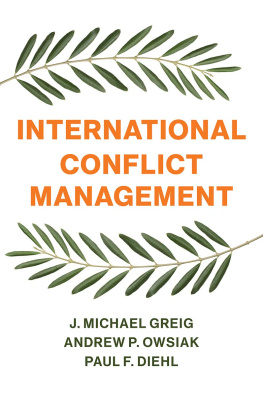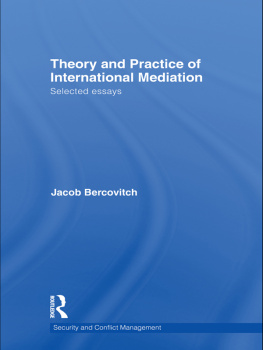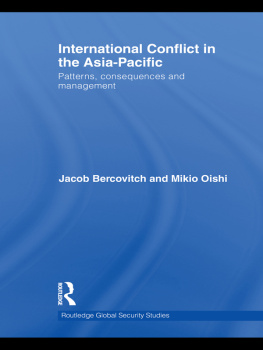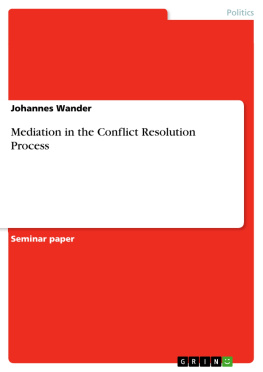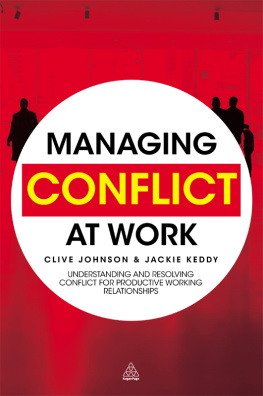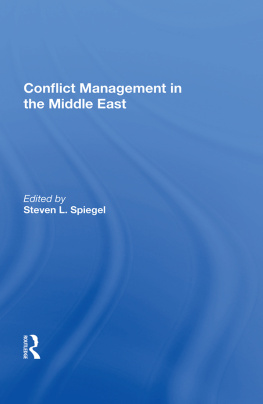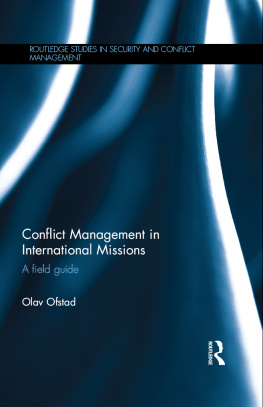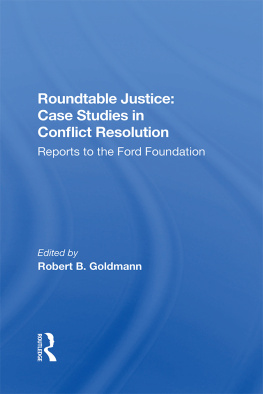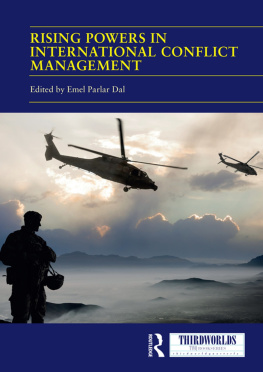
International Conflict Management
J. MICHAEL GREIG, ANDREW P. OWSIAK, AND PAUL F. DIEHL
polity
Copyright J. Michael Greig, Andrew P. Owsiak, and Paul F. Diehl 2019
The right of J. Michael Greig, Andrew P. Owsiak, and Paul F. Diehl to be identified as Authors of this Work has been asserted in accordance with the UK Copyright, Designs and Patents Act 1988.
First published in 2019 by Polity Press
Polity Press
65 Bridge Street
Cambridge CB2 1UR, UK
Polity Press
101 Station Landing
Suite 300
Medford, MA 02155, USA
All rights reserved. Except for the quotation of short passages for the purpose of criticism and review, no part of this publication may be reproduced, stored in a retrieval system or transmitted, in any form or by any means, electronic, mechanical, photocopying, recording or otherwise, without the prior permission of the publisher.
ISBN-13: 978-1-5095-3055-7
A catalogue record for this book is available from the British Library.
Library of Congress Cataloging-in-Publication Data
Names: Greig, J. Michael, author. | Owsiak, Andrew P., author. | Diehl, Paul F. (Paul Francis), author.
Title: International conflict management / J. Michael Greig, Andrew P. Owsiak, Paul F. Diehl.
Description: Cambridge, UK ; Medford, MA : Polity Press, 2019. | Includes bibliographical references and index.
Identifiers: LCCN 2018054233 (print) | LCCN 2019016696 (ebook) | ISBN 9781509530557 (Epub) | ISBN 9781509530526 (hardback) | ISBN 9781509530533 (pbk.)
Subjects: LCSH: Conflict management--International cooperation. | Peace-building--International cooperation. | Diplomatic negotiations in international disputes. | Pacific settlement of international disputes.
Classification: LCC JZ6368 (ebook) | LCC JZ6368 .G74 2019 (print) | DDC 327.1/7--dc23
LC record available at https://lccn.loc.gov/2018054233
The publisher has used its best endeavours to ensure that the URLs for external websites referred to in this book are correct and active at the time of going to press. However, the publisher has no responsibility for the websites and can make no guarantee that a site will remain live or that the content is or will remain appropriate.
Every effort has been made to trace all copyright holders, but if any have been overlooked the publisher will be pleased to include any necessary credits in any subsequent reprint or edition.
For further information on Polity, visit our website: politybooks.com
About the Authors
J. Michael Greig is Professor of Political Science and University Distinguished Teaching Professor at the University of North Texas. He is the co-author of International Mediation (2012) and numerous articles in leading international relations journals. His recent research examines the onset and termination of civil conflict, peacekeeping, and diplomacy.
Andrew P. Owsiak is Associate Professor of International Affairs at the University of Georgia. He is the author of numerous articles in leading international relations journals. His areas of expertise include interstate conflict and conflict management processesincluding diplomacy, territorial disputes, rivalries, war, and non-violent conflict management strategies.
Paul F. Diehl is Associate Provost and Ashbel Smith Professor of Political Science at the University of Texas-Dallas. He is the co-author most recently of The Puzzle of Peace (2016) and Past President of the International Studies Association and the Peace Science Society (International) respectively. His areas of expertise include the causes of war, UN peacekeeping, and international law.
Introducing International Conflict Management
The Korean War ended in 1953. Nevertheless, the threat of renewed war on the Korean peninsula has persisted constantly between then and now. More than forty militarized disputes (involving the threat, display, or use of military force) related to the conflict have occurred in this period. Although nuclear concerns date back to 1993 when North Korea first threatened the Nuclear Non-proliferation Treaty (NPT), the risk of nuclear war stemming from the peninsulas conflict has accelerated since North Korea began nuclear tests in 2006.
It is fortunate that none of the post-1953 Korean confrontations has escalated to full-scale war. Some of this success results from the myriad conflict management efforts of the international community. Over the past seven decades, various actors have employed a wide range of approaches to manage the conflict. Military intervention under United Nations (UN) auspices first attempted to control and end the conflict in 1950, even as it later expanded, perhaps prolonged, the war, and contributed to the stalemate of 1953. Subsequent negotiations between the United States, South Korea, and North Korea dealt with a variety of issues, from lower-order concerns (e.g., reuniting families) to mid-level concerns (e.g., humanitarian aid) to issues central to the conflict (namely, the acquisition of nuclear weapons by North Korea). On occasion, these negotiations have even been facilitated by third-party mediators, as when ex-US President Jimmy Carter acted as a go-between in the 1994 nuclear negotiations.
Conflict management efforts have not, however, been confined to diplomacy alone. The UN and individual countries have imposed economic sanctions on North Korea and its leadership at various junctures and to various degrees. These coercive tactics are designed to discourage North Korea from further advancing its nuclear program and, ideally, to encourage it to abandon its desire to possess nuclear weapons at all. Importantly, they also follow failed attempts at consensual conflict management rooted in international law. One hundred and ninety-one countries have voluntarily accepted the NPT, with non-nuclear states promising to use nuclear power only for peaceful purposes and to foreswear any weapons development. International legal agreements have consequently received credit for limiting the number of new nuclear states (Fuhrmann and Lupu 2016), as well as proving effective in restraining North Korea.
The enduring conflict in Korea provides a window into the myriad approaches available for international conflict management, along with the conditions affecting their successes and failures. This book reviews the most prominent of these approaches, used widely to manage both interstate and civil conflicts. At one end of the spectrum sit the more coercive means of compelling protagonists to cease their violent or otherwise undesirable behavior; military intervention and sanctions fall into this category. The rest of the spectrum contains a variety of less hostile conflict management approaches, under which disputants cede various degrees of control over the conflict management process and outcome to third-party actors. Negotiation and mediation, for example, require the cooperation of disputants to begin the conflict management process, reach a settlement on the disputed issues, and enforce any settlement terms. Peacekeeping and peacebuilding activities, on the other hand, still rely on cooperation to a significant degree, but their outcomes rely extensively on the effectiveness of the third parties that conduct the peace operation. Somewhere between mediation and peacekeeping lie the legal approaches (adjudication and arbitration) in which the disputants permit a third party (court or arbiter) to settle their disputed issues, usually through formal, legal processes over which the disputants have little control.
This is a book about conflict management. As such, we begin with defining conflict
Next page
